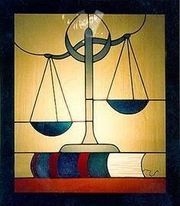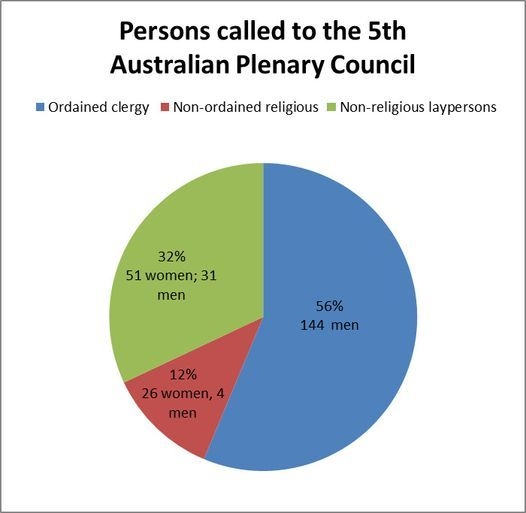
Catholics for Renewal
Subtitle
Editorial (March 2020)
5th Australian Catholic Plenary Council:

Has the diversity of voices been called?
The President of the Plenary Council, Archbishop Timothy Costelloe SDB, has now ‘called’ 256 persons to participate in the forthcoming Plenary Council and announced their names. The question now is: Will the so-called ‘delegates’ represent adequately the voices and voiced concerns of the people of God in Australia?
Previous plenary councils held in
Australia were exclusively clerical gatherings: only bishops and priests were
present. Laypersons could not be invited to participate. Vatican II changed
that, allowing the participation of the laity; but the 1983 Code of Canon Law set limits.
In its submission to the Plenary
Council, Catholics for Renewal argued that a significant lay voice had to be
present if the Council was to give witness to the Church as a community of
believers. There and in Getting Back
on Mission: Reforming Our Church Together, we recommended that at least one third of all those to be
‘called’ to participate in the Council should be non-religious lay women and
men, that they be gender balanced, that each of the 35 particular churches
(dioceses, eparchies, ordinariates) in Australia have a basic representation
of 1 priest, and 1 male and 1 female non-religious lay person, and that more be
called from the largest dioceses to represent the greater diversity within
them.
It was pleasing to learn, therefore, when the names of those ‘called’ to the Council by the Council President were announced, that these recommendations had been taken into account. We note, however, that the significant diversity in the largest dioceses still lacks an adequate voice.
In the first group of 167 named church officials who MUST be called, there are: 38 bishops; 36 vicars general; 28 episcopal vicars; 9 seminary rectors; 3 vice-chancellors /president (all lay) of Catholic universities (ACU, Notre Dame, Catholic Institute of Sydney); 6 (2 clerical and 4 lay) heads of faculties of theology and canon law (ACU, Notre Dame, CTC, Catholic Institute of Sydney); and 47 major superiors of religious congregations and societies of apostolic life (23 male and 24 female).[1]
Canon law provides that a second group that MAY be called may not comprise more than half of that 167, namely 83. Yet 89 persons (52.3%) in this second group have already been ‘called’ - 11 priests, 1 deacon, 2 religious sisters, 49 laywomen, and 26 laymen – and it has been indicated that more laypersons are still to be called. This suggests that the ACBC did seek a dispensation and the Holy See made a concession. We congratulate the Australian bishops on this achievement.
Of the 256 persons already called, 82 are non-religious lay women (51) and men (31). They constitute 32% of the total participants, close to the recommended minimum one third of all participants. Within the lay participants, the weighting is in favour of women (62% to 38%); similarly within the religious superiors (52% female to 48% male). The average age of the lay persons in the ‘may be called’ group is 48 years,[2] but we are yet to see if lay Catholics in the 60-80+ yrs cohort, who contributed 42 per cent of the written submissions, have an adequate voice.

Overall, 144 of those called are
ordained clerics (56.3%), 30 (11.7%) are lay religious men (4) and women (26),
and 82 (32.0%) are non-religious lay women (51) and men (31). There are 179 men
(69.9%) and 77 women (30.1%).
A final figure of all to be called is still to be determined, but around 270 is possible.
Among
all those called, only the 38 bishops (or equivalent) will have a ‘deliberative
vote’; all others will have a ‘consultative’ vote. How that consultative vote
will be exercised and how the bishops give consideration to those votes will be
vital. Canon law provides that decision makers in such circumstances may not
act contrary to a consultative vote without an “an overriding reason” (Canon 127).
The Council President is also likely to invite a number of ‘guests’ to participate in the Council. He may allow them to speak, but not to vote.
Delegates or participants
The ACBC Mediablog makes it clear that it is the Plenary Council president who has ‘called’ the participants to the Council, not the bishops of the individual dioceses, eparchies or ordinariates who have ‘sent’ them.
It seems surprising, therefore, that those who have been ‘called’ are being referred to as ‘delegates’, which according to the dictionary means persons elected/selected and ‘sent’ - not ‘called’ – with their authority deriving from the sender. With the Plenary Council, this is not the case. All those who have been ‘called’ by the Council President derive whatever authority they have – namely, to speak and to vote - from their official ‘call’ to participate.
The canon law on plenary councils does not talk about ‘delegates’, but about ‘participants’ and ‘those who are called’. With the exception of the diocesan bishop, it does not seem proper that they be referred to as ‘delegates’ as if they have been authorised to represent their particular church and have authority to speak on its behalf.
Participants should speak and vote
only in accordance with their own conscience and their own informed sense of
the faith (sensus fidei) for the
common good of the whole Church in Australia. This requires that they inform
themselves of the views and concerns expressed by all the faithful in the ‘Listening
and Dialogue’ and the ‘Listening and Discernment’ phases of the preparatory
stage.
Greater inclusion for all
In its Final Report on the 17,547 written submissions to the
Council, the National Centre for Pastoral
Research[3]
identified the theme of ‘inclusion’ or ‘greater inclusion for all’ as very
significant. It comes up 51 times in the report and encompasses greater
inclusion for women (including among the ordained), LGBTIQA+[4] persons,
Aboriginal and Torres Strait Islander Australians, Catholics ‘divorced and
remarried’, and other vulnerable groups. In its own analysis of the 25 Diocesan
Reports so far published, Catholics for Renewal has found this was
the ‘most widely discussed’ theme in all dioceses and the # 1 theme most widely
discussed in all but one diocese.
We hope that among those still to be
called or invited as guests there will be some persons from the LGBTIQA+
community and some from those who have divorced and remarried, so that their
life experiences can be heard directly within the Council.
First Session of Council on schedule?
The COVID-19 crisis is having a grave
impact on Australian society, particularly those who are more vulnerable. The
Federal Government is talking about a minimum of 6 months before things start
to return to normal. It is now possible that the First Session of the Plenary
Council, planned for 5-11 October 2020, will be deferred, providing more time
for a more considered agenda and better preparation for those called to the
Council.
When Catholics for Renewal has completed its own research on the Diocesan Reports and other documentation published by the Plenary Council we will communicate the results in our further and more frequent Newsletters.
Image:Antonio Mirales, Administracion de Justica
[1] The ACBC Mediablog states that the total number called in this group “added up to 180 delegates’. This is incorrect.
[2] The known ages of 9805 individuals who made written submissions to the Council shows that 20% (1,967) came from persons aged 13-29 yrs, 38% (3,714) from persons aged 30-59 yrs, and 42% (4,124) from persons aged 60-80+yrs.